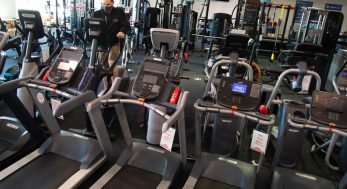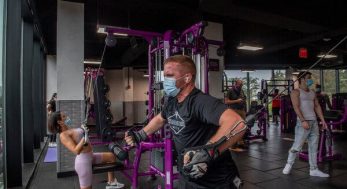
As the fitness industry struggles to regain members following its 12-week pandemic shutdown, Colorado gym operators have formed a new advocacy group to represent their interests in discussions with public health authorities, share best-practices information with each other, and show members it’s safe to return.
The goal of the Colorado Fitness Coalition is to “keep our community fit, our members safe and our businesses open,” according to its website.
It’s been a challenging, scary summer for gyms and fitness studios because members have been slow to return since the state allowed them to reopen on June 4.
“It’s a very tough time in the industry,” said JoAnna Masloski, a member of the coalition’s advisory board and chief operating officer for the Colorado Athletic Club, which has seven Front Range facilities. “Our membership is not where we want it to be, but we’re … fighting tooth and nail for what we know is important. We know we need to stay open, because there are people that absolutely need us.”
According to an informal online survey conducted last month by RunRepeat.com, which bills itself as the world’s largest athletic shoe review site, only 42.5% of Colorado gym members responding to questions on the site said they had returned to their gyms. And that was the fifth-highest rate in the nation.
RELATED: All the gyms, yoga studios that have permanently closed during the coronavirus outbreak
It was not, however, a scientific survey. The site simply asked users to answer a few questions about their attitudes toward gym membership. With more than 5,000 users responding around the world, the percentage of Americans who said they had returned to their gyms was just under 31%. More than 59% said they had canceled their memberships or were thinking about it.
Colorado had the second-highest percentage of people who said they were keeping their gym memberships (51.25%), but 25% said they had canceled memberships and 23.75% said they were considering canceling. If that were to hold true, Colorado’s fitness industry could lose nearly half of its pre-pandemic business.
“We understand that people do not feel comfortable yet coming back and working out at the gym,” said Robin Jost, head of human resources for a company that owns eight of Colorado’s 29 Planet Fitness locations. “Membership is down a bit this summer, but we are seeing trends moving in a positive direction. Typically the fitness industry is slower in the summer months, and some people are just feeling a little bit more comfortable working out from home.”
Jost, who also is a Colorado Fitness Coalition advisory board member, said the organization is comprised of 30 partners representing 170 facilities. Those include Planet Fitness, 24 Hour Fitness, Colorado Athletic Club, Orangetheory Fitness and CorePower Yoga.
“When we closed in March, each gym was working with their local health department, working with the governor’s office, and we were each pushing to get our gyms open,” Jost said. “The fitness industry has known forever that we needed to come together to form an association, similar to the restaurant association, to speak with one voice. It’s never been a more important time, in the history of the fitness industry, to come together. We’re putting competition aside and presenting this unified voice.”
Coalition members sign pledges promising their facilities will adhere to state and local health department orders, including the governor’s mask mandate, will “remind members and Team Members about best practices, and will use reasonable efforts to enforce the rules and guidelines.”
“We have a passion for fitness, and now it has turned into a purpose,” Masloski said. “It has just solidified the entrepreneur mindset in the fitness industry — to find creative solutions for whatever the challenges are.”
Those challenges are not without ironies. The fitness industry has always catered to people who work out to improve their health and fitness. Amid the pandemic, obesity has been identified by the Centers for Disease Control as one of the increased risk factors for COVID-19. Yet many would-be exercisers are reluctant to return to their gyms for fear of falling victim.
“Unfortunately, those who are being the most impacted by COVID are those who are least healthy,” Masloski said. “The more you can move and pursue these types of activities, the better chance you have of staying out of the hospital, if you do get it.”
Despite the challenges facing the industry, Jost says she has no doubt it will survive.
“We are very, very optimistic that we will come out stronger than ever,” Jost said. “Being physically fit is going to help you combat COVID, and it’s also going to help you possibly not get COVID; it will strengthen your immune system. We’re very positive for the future of our business and the fitness industry in general.”


